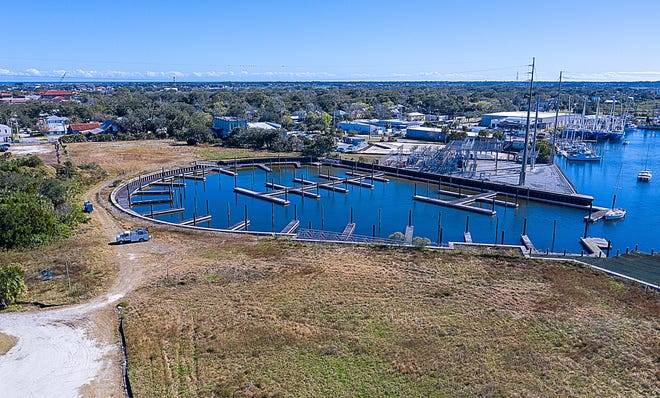This deeply-flawed development began with a series of environmental crimes -- Atlanta Gas Light's Superfund site polluted the area, requiring EPA-supervised cleanup. Then City Manager WILLIAM BARRY HARRISS' ordering a landfill dumped in a lake 2005-2006, because he was in a hurry. Sixteen (16) years later, yet another secretive group of corporate owners are demanding City zoning favors.
Our Commissioners are now better-behaved better-informed and more independent minded than the slothful slugs typified by disgraced dictatorial clods like former Mayors CLAUDE LEONARD WEEKS, JR., and JOSEPH LESTER BOLES, JR., greedy gusses who see government as a cash register, put their for their own looting (see 81 St. George Street no-bid lease).
Kleptocrats investing in Florida real estate: look elsewhere. Corruption is going out of style here. Hiring dubious "developers" and fast-taking corporate lawyers will no longer sway us here in St. Augustine.
I remember when the late corrupt Rogers Towers corporate lawyer GEORGE MORRIS McCLURE told Commissioners, led by Mayor JOSEPH LESTER BOLES, JR., that a Westin Hotel was planned for the site, I asked for documents. BOLES said none were required. BOLES would not even address my questions to the developer's mouthpiece. Small town lawyers BOLES and McCLURE were tight, Dull Republican Lords of All They Survey.
Then Mayor Nancy Shaver was elected in 2014, and corruption is going out of style.
Thanks to all five current St. Augustine City Commissioners for sending greedy developers back to the drawing board. It's our time and our town. From St. Augustine Record:
St. Augustine Commission seeks changes for Sebastian Inland Harbor

The Sebastian Inland Harbor development will get another chance in front of the St. Augustine Commission, but not without the development team making some changes first.
St. Augustine commissioners voted 5-0 Monday night to repeat a first hearing for a revised development agreement. It needs two positive votes from the commission at two hearings to be enacted.
Commissioners asked a multitude of questions, requested changes and raised a number of concerns about parking, design, landscaping, impacts to flooding, increased traffic and other issues. They moved the first hearing to Feb. 22.
Commissioners said Monday they weren’t satisfied with the design and that the development is critical in its location and potential impacts. It's a rare large piece of property in downtown St. Augustine connected to a waterfront portion of King Street, one of the city's entrance corridors.
More:San Sebastian Inland Harbor development in St. Augustine sparks debate
Commissioner John Valdes, who said the traffic increase was his primary concern, urged the developers to ask their design team to come back with something “that makes the pulse rush.”
"This does nothing for me architecturally. … I think your team has an opportunity here to create something special for the city of St. Augustine,” Valdes said.
Valdes suggested considering allowing the buildings to be taller to allow more freedom in the design.
"If you can't see it from the Bridge of Lions, that's my gauge," he said.
The project has already been approved in a different form, but developers are requesting changes.
The project would be a large waterfront complex next to Riberia Street, King Street and the San Sebastian River with hotel rooms, apartments, shops and a marina. The San Sebastian Winery is part of the project. Other than the winery and marina, the land is undeveloped.
Under the new development agreement, the project would feature a maximum of 165 apartments; up to 167 hotel rooms with associated spaces ("a banquet hall and meeting rooms, restaurant, lounge, spa and exercise facilities and gift shop"); up to 27,000 square feet of retail and commercial space; a marina with up to 65 slips; two parking garages ― one for the apartments and one for the rest of the complex and the public; and some on-street parking.
The new development plan "reflects a reduction of 58 hotel rooms and approximately 10,000 square feet of retail space in exchange for an increase of 80 multi-family units," and the owners have eliminated plans for adding 75-foot and 90-foot towers.
Among other things, commissioners said they were concerned that up to 35% of the apartments on site would be able to operate as vacation rentals under the new agreement.
“I don’t know why you would want to do that, but it doesn’t sound like a very good idea,” Vice Mayor Nancy Sikes-Kline said.
City Attorney Isabelle Lopez said the city can ask the developers to reduce the number of short-term rentals allowed, but the city can't prohibit them in the ordinance because of state law.
Barbara Blonder said was leaning toward denying the changes. Her concerns included water conservation elements not being incorporated in the project and workforce or affordable housing not being included.
The project is billed as a place people will be able to live and work.
"I don't think service workers could afford to live in these apartments," Blonder said.
To help with traffic impacts, Blonder suggested the city look into creating a mobility fee that could be applied to the project. The city doesn't charge traffic impact fees for developments.
The project is expected to be worth $80 million to $100 million once built, and it is expected to bring in about $750,000 in tax revenue annually for the city and its Historic Area Community Redevelopment Area, project attorney Ellen Avery-Smith said. The property is part of that community redevelopment area, which was established in 2000 "to address parking and transportation blight" downtown, according to the city.
The city's Planning and Zoning Board recently recommended that the commission approve the revised project, but the board also requested adjustments.
Some city residents oppose the project because of its scale and how much it would increase traffic.
The developers have said they are ready to start building parts of the project, including apartments and a parking garage, over the next few years.
No comments:
Post a Comment